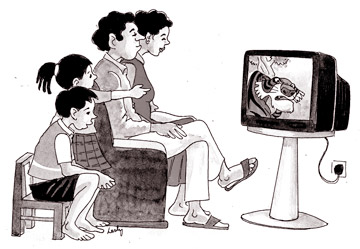The idiot-box turns into a teacher and entertains better
Frederick NORONHA
Can music videos on TV herald a revolution in literacy? Yes, believes
a young researcher Dr Brij Kothari, who after years of struggling is
finally getting a chance to take his ideas forward once again on a wider
national level across India.
Simply put, the innovative approach that Kothari has been propounding
relies on getting neo-literates to do some reading and deepen their
skills, even while they are glued to the ‘idiot box’ watching
film-related entertainment. According to Kothari this can be done by
subtitling the lyrics of the existing song-based programming on TV in
the same language as the audio.
There is, in fact, an easy and cost-effective way of doing this...
though convincing decision-makers might be the more difficult part of
the job. This is the experience that has emerged from experiments
conducted in regional pockets of Western India.
Literacy rate
 India’s
impossible problem is that even though the country’s literacy rate is
rising, it is a well-known fact that the actual literacy skill levels
remain very low among half the people whom our census considers to be
literate. In other words, one-third of India’s population is fully
literate, one-third non-literate and one-third at early stages of
literacy (but not functionally literate). India’s
impossible problem is that even though the country’s literacy rate is
rising, it is a well-known fact that the actual literacy skill levels
remain very low among half the people whom our census considers to be
literate. In other words, one-third of India’s population is fully
literate, one-third non-literate and one-third at early stages of
literacy (but not functionally literate).
Kothari calls his method ‘same-language subtitling’ (SLS).
Conventional subtitling has meant transcribing and translating the
dialogue in a different language from the original, mainly to allow an
audience to understand a film in a language other than what it was
originally made in. In SLS, however, the subtitling is done in the same
language. For instance, the lyrics of Hindi songs appear in Hindi, Tamil
songs in Tamil and so on in any language.
The synchronisation of audio and text is created through colour
changes in the subtitles, identifying every word as it is being sung.
Subconsciously, neo-literates who are watching follow the text and sing
along, thus strengthening their reading skills even as they enjoy the
music. In this manner, same language subtitling is shown to have
strengthened grapheme-phoneme associations which are weak in ‘early
literate people’.
Says Kothari: ‘The main objective of the SLS project is to weave
reading transactions into everyday popular entertainment so that reading
skill improvement can become a by-product of what people already do,
watch TV! What we are finding is that SLS actually enhances the
entertainment value of song-based programming while also creating a
context in which reading and writing practice is encouraged.’
Communication technology
This SLS project was conceived six years ago and has been financed by
different agencies at various stages. The major funders in the past have
been the Indian government’s ministry of HRD (Education Ministry), DECU-Indian
Space Research Organization in Ahmedabad and Indian Institute of
Management, Ahmedabad. UNESCO (Delhi) too made a contribution at the
beginning of the project. Over the past few years, Kothari has shown
that this method helps to strengthen the reading skills of
neo-literates. It ensures that people who have been taught literacy
skills don’t simply lose the same, but instead allows for their literacy
skills to grow.
In August 2002, Kothari and team decided to go ahead with an
‘Independence from Illiteracy through TV’ by putting ‘an old ICT
(information and communication technology) to new ends’. He said that on
the eve of India’s Independence Day - August 15 - an experiment is
underway by Doordarshan and the Indian Institute of Management,
Ahmedabad to contribute to making every Indian independently literate.
Film-music based ‘Chitrahaar’ is India’s longest running film-based
programme in the history of television. It is especially popular in the
villages. In this way, Kothari hopes to transform India’s ‘staple
entertainment to edutainment that is ‘more’ entertaining’.
This counter-intuitive use of the TV was first proposed six years
ago. Research has since been conducted in three separate experiments at
the classroom, village (on local cable) and state (in Gujarat) levels.
Educationists say findings have been consistent that reading ability
improves steadily as a result of viewing film and folksong-based content
with the addition of same-language subtitling.
‘What is perhaps more relevant to network acceptance of the idea is
that surveys have found that over 99 percent of viewers, semi-literate
and literate alike, actually prefer song programming with SLS than
without,’ says Kothari.
Why so? Viewers have been video-taped in villages and slums trying to
sing along through lip-synching. Same-language subtitling enables
viewers to know the song lyrics, ‘hear’ the words better (useful not
just for the hearing but also the hearing- challenged or deaf) and write
down the lyrics.
Courtesy: Third World Network
Features |



